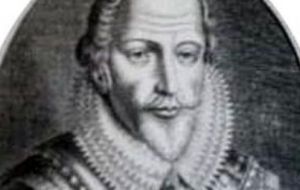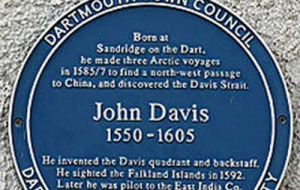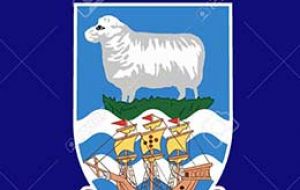MercoPress. South Atlantic News Agency
14 August is Falklands Day, commemorates first sighting of the Islands in 1592
 John Davis, on board his 120 ton vessel 'Desire', the first sighting of the Falklands
John Davis, on board his 120 ton vessel 'Desire', the first sighting of the Falklands  The plaque dedicated to the explorer John Davis at his home in Sandridge
The plaque dedicated to the explorer John Davis at his home in Sandridge  The Falkland Islands coat of arms with the motto “Desire the Right”
The Falkland Islands coat of arms with the motto “Desire the Right” 14 August is Falklands Day and commemorates the first sighting of the Falkland Islands on that day in 1592 by the English navigator and explorer, John Davis, on board his 120-ton vessel 'Desire'. Davis (1550-1605) was one of the principal navigators under Queen Elizabeth I.
He came across the uninhabited islands of the Falklands, having been blown off course on an attempt to round Cape Horn through the Straits of Magellan. His account of this voyage was published in 1600 by Richard Hakluyt of London. Davis was born in Sandridge, Devon and owned a small house on the harbor shore of Plymouth, commemorated by the City Council with a blue plaque.
Davis' sighting was followed by those of Sir Richard Hawkins in 1594 and of the Dutch explorer, Sebald de Weert, in January 1600. But the first recorded landing was not until 1690, when the English sea captain, John Strong, came ashore at Bold Cove near Port Howard from his ship 'Welfare'. Strong gave the name Falkland Sound to the passage between East and West Falklands after Viscount Falkland, then First Lord of the Admiralty, who also happened to be one of the owners of Welfare.
The Falkland Islands derive their name from the Falkland Sound, and Davis' ship 'Desire' is featured prominently on the Falkland Islands coat of arms and in the motto: 'Desire the Right'.
The Falkland Islands never had any native inhabitants and were entirely unoccupied until 1765, when they were first claimed by the British who established a garrison at Port Egmont. Over the years, the British, French and Spanish periodically had garrisons within the Islands until 1811 when all were withdrawn.
On 6 October 1832, an Argentine military garrison arrived in an attempt to establish sovereignty over the Falkland Islands, disregarding the British claim of 67 years prior. Less than three months later, on 2 January 1833, the Royal Navy evicted the military base with no loss of life. The civilian population, who had sought permission from Britain to live there, were invited to stay. A year later, a small, permanent British administration was established and in 1845 Stanley become the capital.
Sheep farming became the main industry of the Falklands which enjoyed a peaceful existence until 1 April 1982, when an Argentine military force invaded the Islands. Seventy four days of foreign occupation ended with Liberation by British forces on 14 June 1982. Nearly 1,000 Falkland Islands, British and Argentine lives were lost as a result of the war.
Since 1982, lives in the Falklands have been transformed: the Islands have become financially self-sufficient (fishing industry and tourism), a democracy entirely self-governing, except for defense and foreign affairs. The community has been formed through voluntary immigration and settlement over the course of nearly two hundred years. It is a diverse multicultural society, with people from over 60 nations having made the Islands their home. At the heart are those Falkland Islanders whose families have been in the Islands for nine generations.
In 2009 a new Constitution confirmed enhanced local democracy, internal self-government and enshrined, following on the UN charter, the Falklands' people right of self-determination and to decide on their future. Four years later in 2013, a referendum was held, which was overseen by international observers, when 99.8% of the electorate voted to remain a British Overseas Territory.
On Friday 20 May 2022, Stanley – capital of the Falkland Islands – was granted official city status by Her Majesty Queen Elizabeth II, as part of Platinum Jubilee celebrations.




Top Comments
Disclaimer & comment rules-

-

-

Read all commentsOne thing is certain, old man, Argentina did not discover the Falklands archipelago.
Aug 15th, 2023 - 06:36 am +2You inherited NOTHING from Spain not Cuba not Hispaniola and most certainly not the Falklands, it is utter and complete nonsense, on top of that you lost a war ,the islands belong to the people who live their and have been there longer than you Argentines that live and stole the whole of what is now Southern Argentina, it is their decision to choose the future path, not London, nor Buenos Aires, no dispute at all its settled,
Aug 17th, 2023 - 10:14 am +2Marv - what have governors got to do with sovereignty? Governors are merely the administrators. The presence, or not, of governors is irrelevant to any question of sovereignty. We didn't have a governor there before 1774 but sovereignty over the western islands was British. Recognised by Spain from 1771.
Aug 22nd, 2023 - 11:16 pm +2By the by, I see that for the 35th year the Decolonization Committee have failed to recommend their Falklands resolution for adoption by the United Nations.
Funny that ;-)
https://falklandstimeline.files.wordpress.com/2022/08/1982-to-1999.pdf
Commenting for this story is now closed.
If you have a Facebook account, become a fan and comment on our Facebook Page!